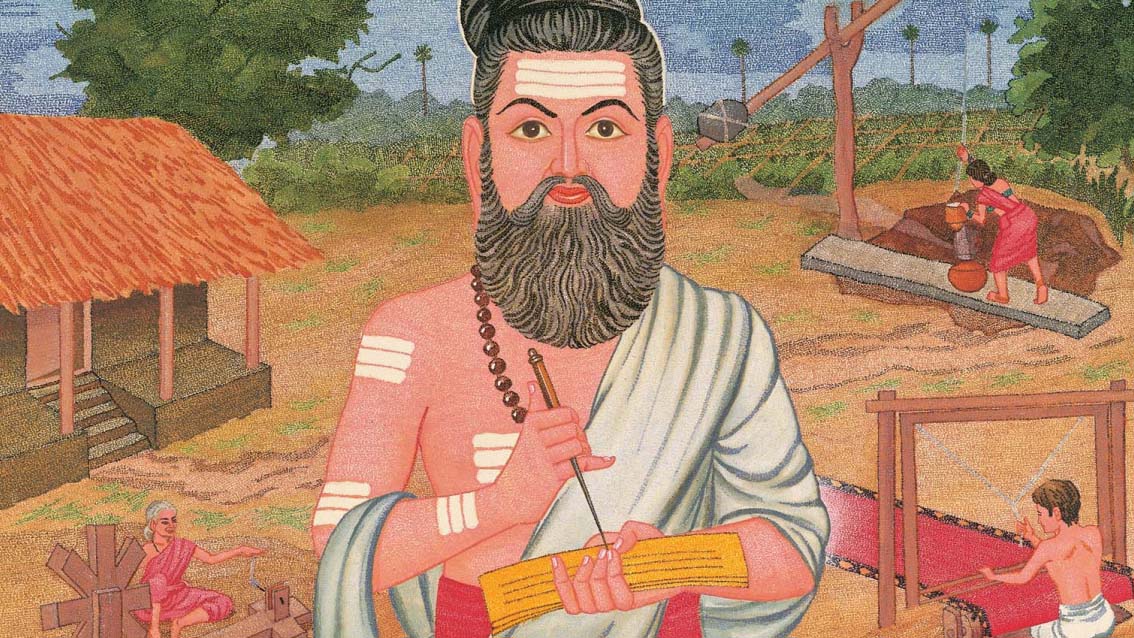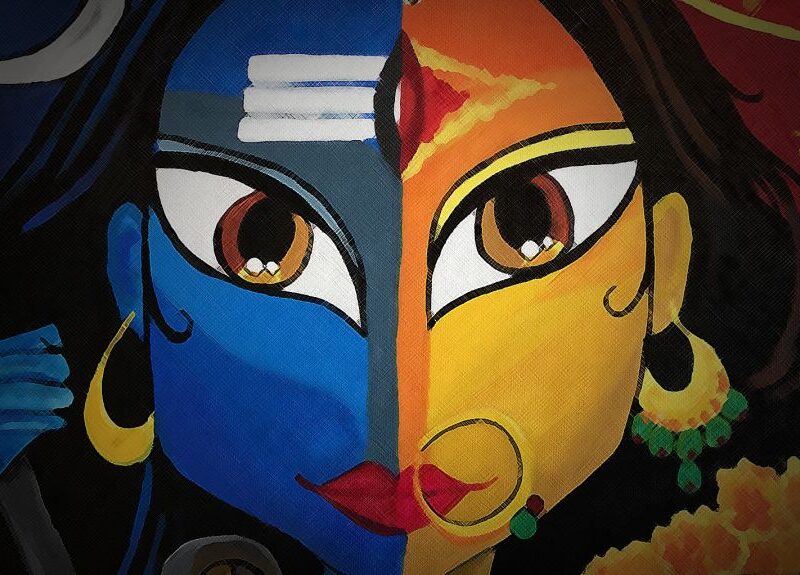
A picture may be worth a thousand words. But sometimes, just seven words can be worth a thousand pictures.
January 15th is celebrated as the birthday of the great Tamil rishi Tiruvalluvar, whose work, the Tirukkural, is affectionately known as the Tamil Veda. The work consists of couplets of incredible wisdom each of which has only seven words.
Virtually nothing of certainty is known about the life of Tiruvalluvar, though other Tamil literary works mention legends about him and his wife Vasuki, famed for her virtue.
The most popular legend is that Tiruvalluvar’s father was brahmin, and his mother came from the Pulayar community, known for their music and craftsmanship, and today is a Scheduled Caste. He was a native of Mylapore (today in Chennai).
Tirukkural has been called by scholars as, “The book without a name, by a man without a name.” Both names came centuries later!
The Tirukkural is dated from anywhere between the 3rd century BCE to 5th century CE. The latter date is pretty certain as the upper bound because a verse from the Tirukkural is cited verbatim in Manimekalai, one of the five famous works of the Tamil Sangam period.
Tirukkural is also a key evidence in affirming that Tamil culture is one of the most beautiful flowers in the bouquet of Sanatana Dharma, and not something distinct from the Vedic tradition.
The claims about his origin that he was Jain (which in my view was anyway part of the syncretic whole of Sanatana Dharma), a disciple of the mythical St. Thomas (missionaries are always enterprising…), or an atheist, are all not true.
This last claim by the DMK party since the 1960s is perhaps the first, and most successful, case of appropriation. One the images below shows the clearly Hindu depictions of Tiruvalluvar even as recently as 1885, 1935 and 1958, when Tiruvalluvar’s appearance was not a political matter, and hence less likely to be distorted by ideological considerations.
Notwithstanding political debates, a look into this nevertheless sheds light on this wonderful text.
The Tirukkural consists of 1330 couplets in 133 chapters (adhikaram), each with 10 verses.
The work is divided into three major parts (pal) namely, virtuous conduct (aram), prosperity (porul), and pleasure (kamam). In Tamil, these three, along with a fourth element of liberation (vitu) are together called urudhiporul, that is “the things” (porul) that provide the “foundational basis” (urudhi) for life. Exactly the same as the four purusharthas of Vedic Hinduism, namely, dharma, artha, kama, and moksha.
While the text does not address vitu (liberation) since it is meant for people living in society, it does cover turavaram (renunciation), as a means to attaining liberation.
Several kurals refer to Vedas, duties of brahmins, protecting cows, and deities such as Indra, Lakshmi, and Vamana.
I could go on and on. But I want here to mention a few verses relating to daily life that touched me as a boy, and which I remember from memory (had to look up the Tamil verses, though!!)
இனிய உளவாக இன்னாத கூறல்
கனியிருப்பக் காய்கவர்ந் தற்று
To speak harsh words instead of pleasant ones, is to covet raw fruits when well ripened ones are available. (Especially relevant to those of us today who argue and debate on social media!!!)
எந்நன்றி கொன்றார்க்கும் உய்வுண்டாம் உய்வில்லை
செய்ந்நன்றி கொன்ற மகற்கு.
There is forgiveness for faltering on any virtue
but not for ingratitude.
தீயினாற் சுட்டபுண் உள்ளாறும் ஆறாதே
நாவினாற் சுட்ட வடு
A wound caused by fire will heal inside;
a scar caused by the tongue never heals. (Mind your words!!)
கற்க கசடறக் கற்பவை கற்றபின்
நிற்க அதற்குத் தக.
Let a man learn thoroughly whatever he may learn, and let his conduct be worthy of his learning.
மறப்பினும் ஓத்துக் கொளலாகும் பார்ப்பான்
பிறப்பொழுக்கங் குன்றக் கெடும்
One can relearn if he forgets the scriptures; but, a brahmin ceases to be one, when he strays from propriety of conduct
I would like to conclude with the first ten verses of the entire work, that chapter titled “Praise of God”, which alone should be sufficient to rebuff DMK propaganda.
- அகர முதல எழுத்தெல்லாம் ஆதிபகவன் முதற்றே உலகு.
As the letter A is the first of all letters, so the eternal God is the origin of the world - கற்றதனால் ஆய பயனென்கொல் வாலறிவன் நற்றாள் தொழாஅர் எனின்.
What profit have they derived from learning, who worship not the good feet of Him who is possessed of pure knowledge? - மலர்மிசை ஏகினான் மாணடி சேர்ந்தார் நிலமிசை நீடுவாழ் வார்
Those who surrender themselves at feet of the one, who resides in the flower-like hearts of all, will live long and well - வேண்டுதல் வேண்டாமை இலானடி சேர்ந்தார்க்கு யாண்டும் இடும்பை இல
To those who meditate the feet of Him who is void of desire or aversion, evil shall never come - இருள்சேர் இருவினையும் சேரா இறைவன் பொருள்சேர் புகழ்புரிந்தார் மாட்டு
The two-fold harm (i.e., punya and paapa) that springs from the darkness of ignorance shall not affect those who delight in the true praise of God - பொறிவாயில் ஐந்தவித்தான் பொய்தீர் ஒழுக்க நெறிநின்றார் நீடுவாழ் வார்
They shall long prosper who abide in the faultless way of Him who has destroyed the five desires of the senses - தனக்குவமை இல்லாதான் தாள்சேர்ந்தார்க் கல்லால் மனக்கவலை மாற்றல் அரிது
Anxiety of mind cannot be removed, except from those who are united to the feet of Him who is incomparable - அறவாழி அந்தணன் தாள்சேர்ந்தார்க் கல்லால் பிறவாழி நீந்தல் அரிது
Except those who surrender at the feet of God, the ocean of dharma, others will struggle to cross the ocean of births - கோளில் பொறியின் குணமிலவே எண்குணத்தான் தாளை வணங்காத் தலை
The head that worships not the feet of Him who is possessed of eight attributes, is as useless as a sense organ without the power of sensation - பிறவிப் பெருங்கடல் நீந்துவர் நீந்தார் இறைவன் அடிசேரா தார்
None can swim the great sea of births but those who are united to the feet of God








































